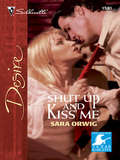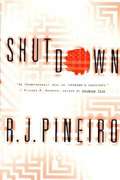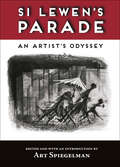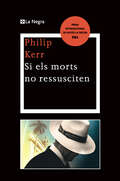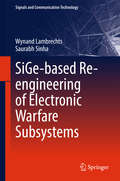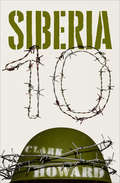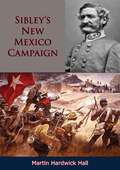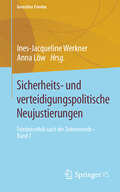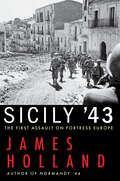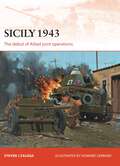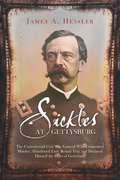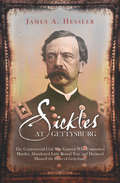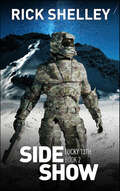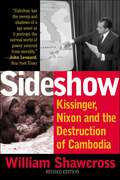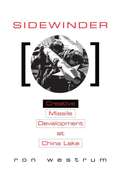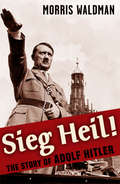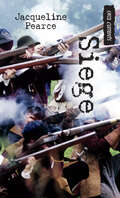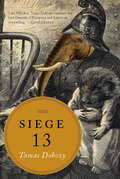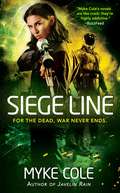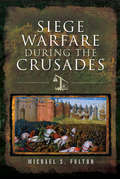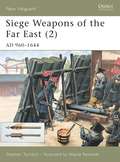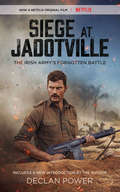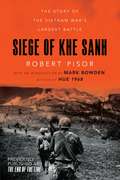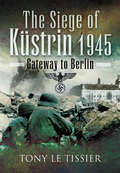- Table View
- List View
Shut Up and Kiss Me (Stallion Pass: Texas Knights #1)
by Sara OrwigA MAN, A WOMAN…A BABY?Colonel Mike Remington wasn'ta man who backed away froma challenge. But the tough,combat-hardened Special Forcesofficer knew he was way out of his league when hecradled an adorable baby in his arms—and an elegant,enticing lady lawyer told him he was the little girl'sbrand-new “daddy”….The only solution to his sudden baby problem wasmarriage—in name only—to the lady lawyer herself. Butthe more time he spent on a secluded Texas ranch withthe beautiful, sensual Savannah Clay—and the more“innocent” kisses they shared—the more he ached to seethis make-believe marriage turn into the real deal….
Shutdown
by R. J. PineiroA faulty computer chip causes a fatal train accident, sending its manufacturer into a downward spiral. When the chip is traced to sabotage, an FBI agent and a hacker team up to investigate before the next shutdown.
Si Lewen's Parade: An Artist's Odyssey
by Si LewenA pioneering, wordless graphic novel detailing the horrors of war in the 20th Century, featuring an overview of the artist’s career.Si Lewen’s Parade is a timeless story told in a language that knows no country—a wordless epic that, despite its muteness, is more powerful than the written or the spoken word. First published in 1957, TheParade is a lost classic, newly discovered, remastered, and presented by Art Spiegelman, the Pulitzer Prize–winning author of Maus. Reproduced in print as a unique two-sided accordion-fold format with an extensive overview of the artist’s career on the verso, The Parade is a celebration of art and the story of recurring war as Si Lewen experienced it over the past 90 years, watching the joyful parades that marked the end of World War I lead into the death marches of World War II and the Korean War. As The Parade unfolds, the reader is taken on an unforgettable journey of sequential images.“An eloquent and vigorous protest against war’s horror and futility.” —New York Times, from an exhibition review of The Parade, 1953“Nothing can equal the psychological effect of real art. . . . Our time needs you and your work!” —Albert Einstein, from a letter to Si Lewen, 1951“The Parade is a powerfully moving free-jazz dirge of a book that depicts mankind’s recurring war fever. It remains sadly urgent and relevant today.” —Art Spiegelman, from his introduction“A compelling testament to Lewen’s gifts for stirring our souls with the silent grace of painted panel after panel after panel. As narrative, it is music by which to mourn Man’s fate.” —The Washington Post
Si els morts no ressuciten
by Philip KerrCínic i descarat, però honest i sensible, Bernie Gunther és el protagonista de la sèrie «Berlin Noir», amb què Philip Kerr ha conquerit lectors d'arreu del món. Guanyadora del III Premi Internacional de Novel·la Negra RBA. Un any després d'abandonar la KRIPO, la Policia Criminal alemanya, Bernie Gunther treballa a l'Hotel Adlon, on s'allotja la periodista nord-americana Noreen Charalambides, que ha arribat a Berlín amb la intenció d'investigar el creixent fervor antisemita i la sospitosa designació de la ciutat com a seu dels Jocs Olímpics de 1936. La Noreen i en Gunther s'associen dins i fora del llit per seguir la pista d'una trama que uneix les altes esferes del nazisme amb el crim organitzat dels Estats Units. Però la Noreen és obligada a tornar al seu país, i en Gunther, una vegada més, haurà de contemplar com una dona se li escapoleix. Fins que, al cap de vint anys, tots dos es retroben a l'Havana de Batista, un temps abans de la Revolució.
SiGe-based Re-engineering of Electronic Warfare Subsystems
by Saurabh Sinha Wynand LambrechtsThis book provides readers a thorough understanding of the applicability of new-generation silicon-germanium (SiGe) electronic subsystems for electronic warfare and defensive countermeasures in military contexts. It explains in detail the theoretical and technical background, and addresses all aspects of the integration of SiGe as an enabling technology for maritime, land, and airborne / spaceborne electronic warfare, including research, design, development, and implementation. The coverage is supported by mathematical derivations, informative illustrations, practical examples, and case studies. While SiGe technology provides speed, performance, and price advantages in many markets, to date only limited information has been available on its use in electronic warfare systems, especially in developing nations. Addressing that need, this book offers essential engineering guidelines that especially focus on the speed and reliability of current-generation SiGe circuits and highlight emerging innovations that help to ensure the sustainable long-term integration of SiGe into electronic warfare systems.
Siberia 10
by Clark HowardAs the Vietnam War rages, blood will be shed at a stateside Marine Corps prison, in this novel by a &“superlative storyteller&” (Publishers Weekly).Siberia 10 is a military prison in California, and tensions are coming to a slow boil within its walls. Inmates are trying to escape; guards are practicing constant brutality; racial tensions are seething. Those confined to Siberia 10 have been trained to fight and kill—and in the midst of chaos, things could turn lethal. Into this tinderbox comes Garth Hannon, pulled out of action in Vietnam and flown back to the States for a special assignment: to solve the problem of Siberia 10. But before Hannon can assess the situation and diffuse a time bomb, it may all blow up in his face, in this suspenseful military thriller by an Edgar Award–winning author.
Sibley's New Mexico Campaign
by Martin Hardwick HallThis long out-of-print and hard-to-find classic tells the story of the Texas invasion of New Mexico during the American Civil War. In early 1862, Confederate General Henry Hopkins Sibley marched thirty-four hundred coarse Texas farmboys, cowhands, and frontiersmen into New Mexico and up the Rio Grande Valley. Although seriously bloodied, they repulsed Union troops at the Battle of Valverde. As the poorly supplied Texans pushed northward, New Mexicans stripped the land bare of food, fodder, and livestock. East of Santa Fe at Glorieta, Union volunteers defeated Sibley's Confederates and burned their quartermaster trains, and the starving Texans retreated back down the Rio Grande to El Paso.-Print ed.
Sicherheits- und verteidigungspolitische Neujustierungen: Friedensethik nach der Zeitenwende • Band 1 (Gerechter Frieden)
by Ines-Jacqueline Werkner Anna LöwMit dem russischen Angriffskrieg gegen die Ukraine haben sich die sicherheits- und verteidigungspolitischen Konstellationen fundamental verändert – nicht nur in Deutschland, sondern in ganz Europa. Vor diesem Hintergrund diskutieren die Autorinnen und Autoren des Bandes die Neujustierungen in der deutschen Sicherheits- und Verteidigungspolitik. Dabei stehen zum einen die beiden zentralen Dokumente – die Nationale Sicherheitsstrategie und die neuen Verteidigungspolitischen Richtlinien – im Fokus der Betrachtung. Zum anderen richtet sich der Blick auf die Folgen der US-amerikanischen Wahl im November 2024 für die Sicherheit und Verteidigungsfähigkeit Deutschlands und Europas. Das schließt auch Fragen der nuklearen Abschreckung mit ein.
Sicily '43: The First Assault on Fortress Europe
by James HollandA history of World War II’s Operation Husky, the first Allied attack on European soil, by the acclaimed author of Normandy ’44.On July 10, 1943, the largest amphibious invasion ever mounted took place, larger even than the Normandy invasion eleven months later: 160,000 American, British, and Canadian troops came ashore or were parachuted onto Sicily, signaling the start of the campaign to defeat Nazi Germany on European soil. Operation Husky, as it was known, was enormously complex, involving dramatic battles on land, in the air, and at sea. Yet, despite its paramount importance to ultimate Allied victory, and its drama, very little has been written about the thirty-eight-day Battle for Sicily.Based on his own battlefield studies in Sicily and on much new research, James Holland’s Sicily ’43 offers a vital new perspective on a major turning point in World War II and a chronicle of a multi-pronged campaign in a uniquely diverse and contained geographical location. The characters involved—Generals George Patton and Bernard Montgomery among many—were as colorful as the air and naval battles and the fighting on the ground across the scorching plains and mountaintop of Sicily were brutal. But among Holland’s great skills is incorporating the experience of on-the-ground participants on all sides—from American privates Tom and Dee Bowles and Tuskegee fighter pilot Charlie Dryden to British major Hedley Verity and Canadian lieutenant Farley Mowat (later a celebrated author), to German and Italian participants such as Wilhelm Schmalz, brigade commander in the Hermann Göring Division, or Luftwaffe fighter pilot major Johannes “Macky” Steinhoff and to Italian combatants, civilians and mafiosi alike—which gives readers an intimate sense of what occurred in July and August 1943.Emphasizing the significance of Allied air superiority, Holland overturns conventional narratives that have criticized the Sicily campaign for the vacillations over the plan, the slowness of the Allied advance and that so many German and Italian soldiers escaped to the mainland; rather, he shows that clearing the island in 38 days against geographical challenges and fierce resistance was an impressive achievement. A powerful and dramatic account by a master military historian, Sicily ’43 fills a major gap in the narrative history of World War II.Praise for Sicily ’43A New York Times Book Review Editors’ ChoiceNamed a Best History Book of the Year by the Wall Street Journal“Academic histories are all very well, but at times it is a pleasure to sit back and wallow in an old-school military tale of flinty-eyed men doing battle. That is what James Holland, a seasoned craftsman, offers in Sicily ’43.” —New York Times Book Review“Crisp, detailed, and entertaining. Holland refuses to let the legends overshadow the flesh-and-blood soldiers who fought, bled, and died. Sicily ‘43 is an outstanding look at a stepping-stone to victory.” —Wall Street Journal
Sicily 1943
by Steven Zaloga Howard GerrardNot only did the Sicily operation represent a watershed in tactical development of combined arms tactics, it was also an important test for future Allied joint operations. Senior British commanders left the North African theater with a jaundiced and dismissive view of the combat capabilities of the inexperienced US Army after the debacle at Kasserine Pass in Tunisia in February 1943. Sicily was a demonstration that the US Army had rapidly learned its lessons and was now capable of fighting as a co-equal of the British Army. The Sicily campaign contained a measure of high drama as Patton took the reins of the Seventh US Army and bent the rules of the theater commander in a bold race to take Palermo on the northern Sicilian coast. When stiff German resistance halted Montgomery's main assault to Messina through the mountains, Patton was posed to be the first to reach the key Sicilian port and end the campaign. The Sicily campaign contains a fair amount of controversy as well including the disastrous problems with early airborne assaults and the Allied failure to seal the straits of Messina, allowing the Germans to withdraw many of their best forces.
Sickles at Gettysburg: The Controversial Civil War General Who Committed Murder, Abandoned Little Round Top, and Declared Himself the Hero of Gettysburg
by James A. HesslerA well researched fair and balanced portrayal of the controversial Major General Daniel E. Sickles during the civil war in 1863, this biography is an easy read and gives us a detailed insight into the events.
Sickles at Gettysburg: The Controversial Civil War General Who Committed Murder, Abandoned Little Round Top, and Declared Himself the Hero of Gettysburg
by James A. HesslerFINALIST, 2009, ARMY HISTORICAL FOUNDATION DISTINGUISHED BOOK AWARDWINNER, 2009, THE BACHELDER-CODDINGTON LITERARY AWARD, GIVEN BY THE ROBERT E. LEE CIVIL WAR ROUND TABLE OF CENTRAL NEW JERSEYWINNER, 2009, GETTYSBURG ROUND TABLES DISTINGUISHED BOOK AWARDWinner of The Bachelder-Coddington Literary Award, 2009, given by the Robert E. Lee Civil War Round Table of Central New Jersey. Now available in paperback, 'Sickles at Gettysburg: The Controversial Civil War General Who Committed Murder, Abandoned Little Round Top, and Declared Himself the Hero of Gettysburg', by licensed battlefield guide James Hessler, is the most deeply-researched, full-length biography to appear on this remarkable American icon. And it is long overdue.No individual who fought at Gettysburg was more controversial, both personally and professionally, than Major General Daniel E. Sickles. By 1863, Sickles was notorious as a disgraced former Congressman who murdered his wifes lover on the streets of Washington and used Americas first temporary insanity defense to escape justice. With his political career in ruins, Sickles used his connections with President Lincoln to obtain a prominent command in the Army of the Potomacs Third Corpsdespite having no military experience. At Gettysburg, he openly disobeyed orders in one of the most controversial decisions in military history.No single action dictated the battlefield strategies of George Meade and Robert E. Lee more than Sickles unauthorized advance to the Peach Orchard, and the mythic defense of Little Round Top might have occurred quite differently were it not for General Sickles. Fighting heroically, Sickles lost his leg on the field and thereafter worked to remove General Meade from command of the army. Sickles spent the remainder of his checkered life declaring himself the true hero of Gettysburg.Although he nearly lost the battle, Sickles was one of the earliest guardians of the battlefield when he returned to Congress, created Gettysburg National Military Park, and helped preserve the field for future generations. But Dan Sickles was never far from scandal. He was eventually removed from the New York Monument Commission and nearly went to jail for misappropriation of funds.Hesslers critically acclaimed biography is a balanced and entertaining account of Sickles colorful life. Civil War enthusiasts who want to understand General Sickles scandalous life, Gettysburgs battlefield strategies, the in-fighting within the Army of the Potomac, and the development of todays National Park will find Sickles at Gettysburg a must-read.REVIEWS: The few other Sickles biographies available will now take a back seat to Hesslers powerful and evocative study of the man, the general, and the legacy of the Gettysburg battlefield that old Dan left America. I highly recommend this book. J. David Petruzzi, co-author of Plenty of Blame to Go Around: Jeb Stuarts Controversial Ride to Gettysburg (2006) and with Steve Stanley The Complete Gettysburg Guide (2009)This book is a breath of fresh airit is an objective, thorough, and readable examination of the controversial general. Hessler avoids getting bogged down in extreme reactions typically seen in others who write on this subject. Sue Boardman, Licensed Battlefield Guide, GNMP; Leadership Program Coordinator, Gettysburg Foundation; and author of The Battle of Gettysburg Cyclorama: A History and GuideAbout the Author: James A. Hessler works in the financial services industry and is a Licensed Battlefield Guide at Gettysburg National Military Park. He has taught Sickles and Gettysburg-related courses for Harrisburg Area Community College and the Gettysburg Foundation. In addition to writing articles for publication, Hessler speaks regularly at Civil War Round Tables. A native of Buffalo, NY, he resides in Gettysburg with his wife and children.
Side Show (Lucky 13th #2)
by Rick ShelleyRick Shelley continues the adventures of the hard-fighting Lucky 13th Spaceborne Assault Team in an action-packed military sci-fi novel that sends a small force of fighters on a mission that takes them into territory more hostile than they could ever know....The planet of Jordan has become a hellscape of blood, violence, and ever-present death. The world had been conquered by the brutal Schlinal Hegemony years ago. But now the Accord of Free Worlds has decided to make a determined push to retake the territory they have lost to the enemy.Now, as the battle reaches a lethal stalemate, Sgt. Joe “The Bear” Baerclau and his 13th SAT receive orders to leave their perimeter and venture into the wild. Their target: a secret science lab that was in place before the Schlinal invasion. Their orders: find the scientists if they survived and return them to Accord lines. And if that’s not possible—kill them and destroy all evidence of the lab.Now, Bear and his team must fight a running battle across dangerous unknown territory in search of a covert facility that may or not hide a dreadful secret. Even more lethal than the landscape is the equally skilled Hegemony force that’s hot on their trail and eager for the kill. But for the Lucky 13th, that’s just another day on the job…
Sideshow: Kissinger, Nixon and the Destruction of Cambodia
by William ShawcrossCareful journalistic analysis.
Sideshow: Kissinger, Nixon, and the Destruction of Cambodia
by William ShawcrossAlthough there are many books and films dealing with the Vietnam War, Sideshow tells the truth about America's secret and illegal war with Cambodia from 1969 to 1973. William Shawcross interviewed hundreds of people of all nationalities, including cabinet ministers, military men, and civil servants, and extensively researched U.S. Government documents. This full-scale investigation—with material new to this edition—exposes how Kissinger and Nixon treated Cambodia as a sideshow. Although the president and his assistant claimed that a secret bombing campaign in Cambodia was necessary to eliminate North Vietnamese soldiers who were attacking American troops across the border, Shawcross maintains that the bombings only spread the conflict, but led to the rise of the Khmer Rouge and the subsequent massacre of a third of Cambodia's population.
Sidewinder
by Ron WestrumIn the mid-1950s a small group of overworked, underpaid scientists and engineers, working on a remote base in the Mojave Desert, developed a weapon no one had asked for but that everyone was looking for. Sidewinder is the story of how that unorthodox team at China Lake, lead by the visionary Bill McLean, overcame Navy bureaucracy and more heavily funded projects to develop the world's best air-to-air missile. Based on years of research and hundreds of interviews, Westrum's study examines the unique military-civilian cult of creativity that helped Mclean and his China Lake team produce an amazing array of technological and engineering marvels. In the intellectual pressure cooker provided by the desert isolation, the scientists dreamed and tinkered while test pilots such as Wally Schirra and Glenn Tierney took to the air, often risking life and limb to test a fledgling system. Against the ongoing story of billion-dollar weapons development contracts, astronomical cost overruns, and defense acquisitions scandals, this revealing, highly readable account of the development of one of the most successful weapons in history provides an instructive contrast.
Sieg Heil The Story of Adolf Hitler
by Morris David WaldmanSieg Heil!, first published in 1962, is the account of the life of Nazi-leader Adolf Hitler, written by Morris Waldman, a contemporary of Hitler and head of the American Jewish Committee until the war's end in 1945. The book begins with the story of Hitler's father, Alois Schicklgruber. Young Adolf's hatred for the man and his own unattractive appearance lead to his anti-social character that separated him from other people, an awkwardness in social situations, and a bitterness to those who rejected or ignored him. However, he possessed a shrewd, calculating nature and amazing skills in oration, and, as one of the original seven members of the National Socialist Party (Nazi), used these skills to build the organization into a powerful ruling group with millions of members. The book details events leading to the Second World War and describes his interactions with other leading Nazis such as Goering, Himmler and Goebbels. While not an exhaustive biography, the book offers numerous insights into Hitler's personality which help explain his decisions and their disastrous results.
Siege (Orca Currents)
by Jacqueline PearceWhen Jason agrees to go camping with his cousin Sean, he doesn't picture two weeks at a War of 1812 reenactment camp. But that's where he ends up. The historically accurate camp bans all trappings of modern life, like cell phones and electricity. Jason is not impressed, but they do get to fire muskets, and he secretly likes that, despite the general dorkiness of the camp. And then there's the cute girl who works in the mess tent. And the sneaking around at night getting into trouble is fun until Jason and his friends keep running into a camp counselor who is clearly up to no good. They resolve to find out exactly what the counselor is up to, but they may have taken on more than they can handle.
Siege 13: Stories
by Tamas DobozyStories exploring a world of ordinary people caught between the pincers of aggressors, leading to actions at once deplorable, perplexing, and heroic.In the fall of 1944, the Red Army encircled Budapest, surrounding tens of thousands of German and Hungarian troops, and nearly a million civilians. The ensuing months witnessed one of the most brutal sieges of World War II, with block-to-block guerilla warfare followed by widespread disease, starvation, and unspeakable atrocities. Richly grounded in this historical trauma and its extended aftermath, the stories in Siege 13 alternate between the siege itself and a contemporary community of Hungarian émigrés who find refuge in the West.Illuminating the horror and absurdity of war with wit and subtlety, Tamas Dobozy explores a world in which right and wrong are not easily distinguished, and a gruesome past manifests itself in perplexing, often comical ways.Winner of the Rogers Writers’ Trust Fiction PrizePraise for Siege 13“Alice Munro . . . Isaac Babel . . . Those comparisons may sound daunting, but Dobozy has mastered the technical conventions of his craft . . . This vivid rendering of Hungarian history as a nightmare from which no one quite wants to awake is Dobozy’s finest achievement.” —Garth Risk Hallberg, The New York Times Book Review“The sheer variety of Dobozy’s approaches to telling stories, and his commitment not only to provoke thought but to entertain, constitute a virtuoso performance. Siege 13 is without question one of my favorite story collections ever.” —Jeff VanderMeer, The Washington Post“A superb collection of short stories that revisits two of the deadliest months in Hungarian history. The book tells the stories of those who hid, those who fought, those who betrayed, those who escaped and those who died, and how the effects of the siege still linger, three-quarters of a century later. . . . Siege 13 is one of the best books of the year.” —Mark Medley, National Post (Canada)
Siege Line
by Myke ColeIn Myke Cole’s latest high-octane, action-packed military fantasy, the fate of undead Navy SEAL James Schweitzer will be decided—one way or another...The Gemini Cell took everything from Jim Schweitzer: his family, his career as a Navy SEAL, even his life. Hounded across the country, Schweitzer knows the only way he can ever stop running, the only way his son can ever be safe, is to take the fight to the enemy and annihilate the Cell once and for all.But the Cell won’t be easily destroyed. Out of control and fighting a secret war with the government it once served, it has dispatched its shadowy Director to the far reaches of the subarctic in search of a secret magic that could tip the balance of power in its favor. Schweitzer must join with the elite warriors of both America and Canada in a desperate bid to get there first—and avert a disaster that could put the Cell in control.
Siege Warfare During the Crusades
by Michael S. FultonAn extensive study of the strategy and technology employed by the Franks and Muslims as they fought each other in the Holy Land.Sieges played a key role in the crusades, but they tend to be overshadowed by the famous battles fought between the Franks and the Muslims, and no detailed study of the subject has been published in recent times. So, Michael Fulton’s graphic, wide-ranging, and thought-provoking book is a landmark in the field.Fulton examines the history of siege warfare in the Holy Land from every angle—the tactics and technology, the fortifications, the composition of the opposing armies, and the ways in which sieges shaped Frankish and Muslim strategy at each stage of the conflict. The differences and similarities between the Eastern and Western traditions are explored, as is the impact of the shifting balance of power in the region.The conclusions may surprise some readers. Neither the Muslims nor the Franks possessed a marked advantage in siege technology or tactics, their fortifications reflected different purposes and an evolving political environment, and, although there were improvements in technologies and fortifications, the essence of siege warfare remained relatively consistent.Essential reading for medieval and military historians.“A lavishly illustrated text full of original photographs of sites, many of which are inaccessible and hard to find images of, guides the reader through the strategies, tactics and weaponry of offense and defense in the Latin East.” —The Society for Medieval Archaeology“This is a book you will read once and continually return to not only as an invaluable reference but as a cracking good read.” —Michael McCarthy, battlefield guide
Siege Weapons of the Far East
by Stephen Turnbull Wayne ReynoldsFrom the 11th century AD, East Asian armies made increasing use of exploding missiles and siege cannon to reduce the fortifications of their enemies. Some of these weapons were very similar to those used in Europe - for example, the heavy siege cannon used in the siege of P'yongyang during the Japanese invasion in the late 16th century. Others, like the Korean hwach'a carts mounting over a hundred rockets that were used to bombard the Japanese at Haengiu in 1593, were very different from their European contemporaries. This book details the design and use of the wide range of weaponry available during this period.
Siege at Jadotville: The Irish Army’s Forgotten Battle
by Gerard Doyle Declan PowerJadotville, starring Fifty Shades of Grey's Jamie Dornan, premiere's on Neflix in Fall 2016.In September 1961, another chapter in Irish military history should have been written into the annals, but it is a tale that lay shrouded in dust for years.The men of A Company, Thirty-Fifth Irish Infantry Battalion, arrived in the Congo as a United Nations contingent to help keep the peace. For many it would be their first trip outside their native shores. Led by Commandant Pat Quinlan, A Company found themselves tasked with protecting the European population at Jadotville, a small mining town in the southern Congolese province of Katanga. It fell to A Company to protect those who would later turn against them. On September 13th, 1961, the bright morning air of Jadotville was shattered by the sound of automatic gunfire."In telling the full story for the first time, former soldier Declan Power does the brave men of A Company a great service."--Irish Times (Dublin)
Siege of Khe Sanh: The Story of the Vietnam War's Largest Battle
by Mark Bowden Robert PisorA war correspondent’s masterful blow-by-blow account of the Battle of Khe Sanh, reissued with a new preface by Mark Bowden for the battle’s 50th anniversary. The six-month siege of Khe Sanh in 1968 was the largest, most intense battle of the Vietnam War. For six thousand trapped U.S. Marines, it was a nightmare; for President Johnson, an obsession. For General Westmoreland, it was to be the final vindication of technological weaponry; for General Giap, architect of the French defeat at Dien Bien Phu, it was a spectacular ruse masking troops moving south for the Tet offensive. With a new introduction by Mark Bowden—best-selling author of Hu? 1968—Robert Pisor’s immersive narrative of the action at Khe Sanh is a timely reminder of the human cost of war, and a visceral portrait of Vietnam’s fiercest and most epic close-quarters battle. Readers may find the politics and the tactics of the Vietnam War, as they played out at Khe Sahn fifty years ago, echoed in our nation’s global incursions today. Robert Pisor sets forth the history, the politics, the strategies, and, above all, the desperate reality of the battle that became the turning point of U.S. involvement in Vietnam.
Siege of Kustrin, 1945: Gateway to Berlin (Stackpole Military History Ser.)
by Tony Le TissierThe unexpected arrival of Soviet troops at the end of January 1945 at the ancient fortress and garrison town of Kstrin came as a tremendous shock to the German High Command-the Soviets were now only 50 miles from Berlin itself. The Red Army needed the vital road and rail bridges passing through Kstrin for their forthcoming assault on the capital, but flooding and their own high command's strategic blunders resulted in a sixty-day siege by two Soviet armies which totally destroyed the town. The delay in the Soviet advance also gave the Germans time to consolidate the defenses shielding Berlin west of the Oder River. Despite Hitler's orders to fight on to the last bullet, the Kstrin garrison commander and 1,000 of the defenders managed a dramatic breakout to the German lines.The protracted siege had an appalling human cost - about 5,000 Germans were killed, 9,000 wounded and 6,000 captured, and the Russians lost 5,000 killed and 15,000 wounded. Tony Le Tissier, in this graphic and painstakingly researched account, has recorded events in extraordinary detail, using the vivid eyewitness testimony of survivors to bring the story of the siege to life.
